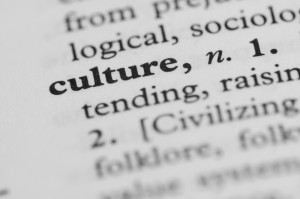2014 was the year culture came to the forefront of the collective imagination. While Oxford chose vape due to the explosive popularity of e-cigarettes, Merriam-Webster named culture “Word of the Year” because of a 15% surge in searches including the term in the past year.
While the sudden uptick in “culture” searches can be partially attributed to recent headlines and news stories about “workplace culture”, “celebrity culture”, and “rape culture” dominating the media, the word has a more nuanced meaning than most realize. A recent article in The New Yorker sheds light on how the word has continued to pique the curiosity of the general public. It’s clear that “culture” has different definitions based on the context in which it’s used:
“If our increasingly analytical, sociological way of thinking about “culture” is helping us to improve the culture, that’s a positive development. Confusion over its evolving meaning is a good reason to look up “culture” in the dictionary, but so is an interest in understanding the world and making it better.”
In years past, lookups for “culture” on Merriam-Webster’s website would spike during the fall, presumably due to students seeking an academic definition for research and coursework. But in 2014, searches remained persistent as the term was used more frequently in social phenomena.
“Culture is a word that we seem to be relying on more and more. It allows us to identify and isolate an idea, issue, or group with seriousness,” explains Peter Sokolowski, Editor at Large for Merriam-Webster. “And it’s efficient: we talk about the ‘culture’ of a group rather than saying ‘the typical habits, attitudes, and behaviors’ of that group. So we think that it may be the increased use of this newer sense of the word culture that is catching people’s attention and driving the volume of lookups.”
As we move into 2015, how do you think perceptions of culture will evolve in society and the global workforce? Do you have a game plan to improve your interactions with your intercultural colleagues?


